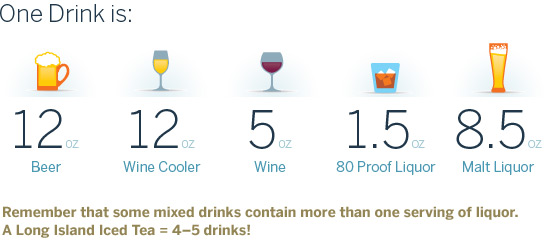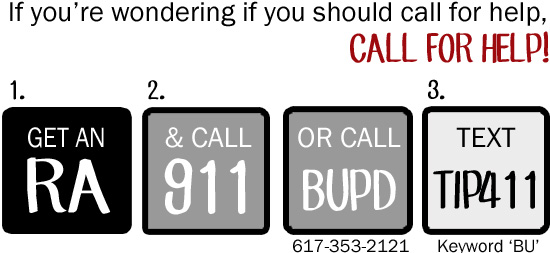If you choose to drink alcohol, be a Terrier who parties smart.

Tips for Safer Drinking
If you choose to drink alcohol, consider using these lower-risk drinking tips:
- Grab some grub
Eat a meal before you start drinking. Food in the stomach slows the absorption of alcohol into the bloodstream, which can help avoid getting drunk too fast. - Read the labels
Make sure it’s safe to drink with any medications you might be taking (prescription or over-the-counter). - Make a plan
Decide ahead of time where you’re going and how you’re getting home. - Stay hydrated
Switch between alcoholic beverages and water. - Pace yourself
The body can only digest 1 drink per hour. - Know your Solo Cup
Learn how to pour a standard drink so you can accurately keep track of how much you’re drinking. - Mix with juice or soda
Avoid energy drinks because they can lead you to drink past your limit. - Sit one out
Pass on shots and games to avoid drinking past your limit. - Set a limit
Decide how much you’ll drink ahead of time and stick to your plan. - Stick together
If you go out together, come home together. - Take a night off
Friends will respect and support the decision not to drink.
What is Blood Alcohol Concentration (BAC)?
As someone drinks, alcohol is absorbed into the bloodstream—resulting in Blood Alcohol Content or Blood Alcohol Concentration (BAC). BAC is the ratio of alcohol to blood in the body, usually expressed as a percentage. BAC is calculated by how many milligrams of alcohol are present per 100 milliliters of blood.
A lower BAC (.02-.05) is related to positive effects from alcohol like feelings of relaxation and confidence. A higher BAC (.06+) is related to more negative, dangerous effects like blackouts or severe impairment.
There are several factors that affect Blood Alcohol Concentration:
- Weight
In general, people that weigh less are affected more quickly by alcohol. - Birth Sex
Since females tend to have greater percent body fat than males, their BAC generally rise more quickly. In addition, females have less of the stomach enzyme that is required to digest alcohol than males. Hormonal fluctuations can also intensify the effects of alcohol in females. - Food
Eating before or while drinking slows the absorption of alcohol into the bloodstream and slows down the rate at which BAC rises. - Strength of Drink
Alcohol content can vary greatly by type of alcohol or drink. Given the same amount of liquid, hard liquor is stronger than wine or beer. - Rate of Drinking
Your body can only digest 1 standard drink per hour. If someone drinks more than one drink per hour, his or her BAC will rise more quickly. - Drug Use
Using legal or illegal drugs while drinking can alter its effects and lead to an unpredictable outcome. Even some over-the-counter medications can do this—so you should always check with a doctor or pharmacist before mixing alcohol with any drug.
Estimate your own blood alcohol concentration using this BAC calculator.
What are Hangovers and Blackouts?
Hangovers
Hangovers often consist of a headache, feelings of thirstiness, nausea or vomiting, dizziness or light-headedness, impaired attention and concentration, and disrupted sleep cycle.
Blackouts
Blackouts are not a loss of consciousness or passing out, but are caused by high levels of alcohol in the body that prevent the brain from forming memories. When experiencing a blackout, a person could not remember a few minutes of the night, a conversation, or entire hours of time. Events like driving or having sex may be forgotten. A blackout may not be apparent to others because the person may have conversations and seem mentally present. However, that person will not recall the conversation later on.
What is Alcohol Poisoning?
Alcohol poisoning is the body’s physiological reaction to excessive alcohol in the body. Like other drugs, it’s possible to overdose on alcohol. If a person is showing signs of alcohol poisoning and isn’t treated, they can choke on their own vomit, become hypothermic, or have seizures. A person’s breathing and heart rate may also slow down, become irregular, or stop. Severe dehydration can also lead to permanent brain damage or death.
There are several warnings that a person is experiencing alcohol poisoning. Think PUBS:
- Puking frequently whether the person is awake, sleeping, or passed out.
- Unresponsive; it is hard to wake them or make them talk to you.
- Breathing that is slow or irregular
- Skin that is cool, pale, bluish, or clammy
It’s critical to call for help if someone is showing any of these signs:
